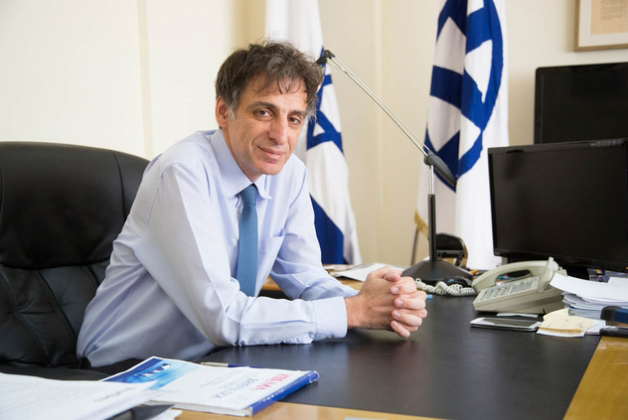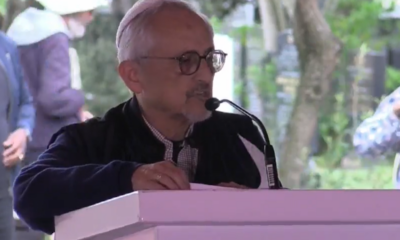
Banner

Storytelling and survival: the Holocaust gets a new script
For decades, the testimony of Holocaust survivors has been the most common tool to teach the younger generation around the world about the Holocaust.
However, until recently, it was different in Israel. According to Israeli ambassador to South Africa, Eli Belotsercovsky, the country had quite a long period in which it was still forming an Israeli identity and the Holocaust didn’t quite fit in.
“People came from Europe, be it Holocaust survivors or others, and they had to blend in,” he says. “They had to turn themselves into Israelis, a strong nation, a strong army. Israel was forming its own national identity based on a kind of heroic narrative. The story of the Holocaust didn’t fit in, so the survivors weren’t really talking about it. They wanted to blend in, to forget the trauma they went through.”
This has changed, however. “Now, with more and more Holocaust survivors having passed away, we need to find new and engaging ways to tell these stories in a way that will be relevant,” says Rose Fridman, the Embassy of Israel’s deputy head of mission to South Africa.
Belotsercovsky was speaking on a panel on Yom Hashoah on 28 April about the role of storytelling in preserving the memory the Holocaust. He and Fridman were in discussion with Gabriella Blumberg, and Jordy Sank, the producer and director of I Am Here, the award-winning film which documents the life of 100-year-old Holocaust survivor Ella Blumenthal.
South Africa is also new to democracy and its history is traumatic and tainted, Sank says. That’s why he was surprised at how well their film resonated with those who either lived during apartheid or felt the effects from their parents or grandparents who experienced that era.
“They resonate with Ella being able to overcome trauma,” Sank says. “They seem to take a page from the book of her incredible outlook on life.”
Blumberg says they used the film to speak not only about the Holocaust, but all forms of discrimination and othering. “It’s a reminder to each of us every day as individuals about how we behave when we encounter someone who is different to us,” she says. “Ella is a shining example of this, so we hope that through storytelling, we can begin these conversations about all forms of othering.”
It isn’t easy to teach the youth about the Holocaust, Belotsercovsky says. “It was probably the most terrible event in human history. Initially, people try to get away from atrocities or events that are particularly heavy. They try to protect themselves from this. You can understand wars and natural calamities,” he said.
“The Holocaust is something that you cannot understand. If you cannot understand it, you try to get away from it. It’s impossible to understand how one nation systematically devises a way to exterminate. From this angle, it’s very difficult to teach the younger generation, which is usually very optimistic.”
Hence, it was the optimistic angle of the film that Belotsercovsky really liked. “People want to connect to people who are optimistic and pass their energy to the viewers,” he says.
Blumenthal survived three concentration camps and yet remained optimistic. “This is something that attracts a lot of people and could be an excellent way to talk about the Holocaust,” says Belotsercovsky.
Says Blumberg, “I’ve always been drawn to creating films that, like this one, will become a catalyst for important conversations, themes, and topics that will bring to light an issue or something happening in society.
“There’s something intuitive about knowing this isn’t just a good story, but it has a good character. Through that character, we can access a world of knowledge and history, and start those conversations,” Blumberg said.
To preserve the memory of the Holocaust, Sank says we should discuss it with family and friends in our homes, but also speak at schools about the stories of survival that our grandparents told us.
“I don’t think I truly understood or felt the gravitas of the Holocaust until I sat and spoke to Ella and started working on the film,” says Sank. “The next generation isn’t going to be so lucky to engage and speak to a Holocaust survivor. It’s so important for them to find out about the personal stories. Pick a name, do research on one person who went through the Holocaust.”
The Nazis not only tried to exterminate the Jewish people, but also their memories. “They tried to destroy all the documents and burn the bodies,” says Belotsercovsky. “The victory is not only in the survival of the Jewish people, but in the survival of memory of what happened.”
When the then 98-year-old Blumenthal was swimming in a pool during the filming of I am Here, she was told that they wouldn’t rush her. “She just said, ‘Nonsense,’ and strode down steps into the pool and swam 10 laps,” recounted Blumberg. “Not only did she show us resilience when it really mattered most – in the Holocaust – but she shows strength and energy in whatever she’s doing.”
Blumberg says Blumenthal exerts the same amount of energy when she meets someone who is different. “She takes the time to hear their side of a story,” she says. “If we could all do this, there would be so much more understanding in the world.”
In the film, Blumenthal uses one tea bag for five cups of tea. “Through the film, we tried to link it to why she acted like that,” said Blumberg. “So, we used animation to show when she was trying to take just a scrap of potato. It’s those links which remind us to understand. When we encounter our grandparents or anyone who has something that we might think is a strange habit, we should think, ‘Where did these things come from?’”
“This is also part of understanding,” says Fridman. “If you understand the person better, maybe you can understand the situation better.”











Hessel Meilech
May 5, 2022 at 10:45 am
They also tried to destroy the Yiddish culture as most Jews spoke Yiddish, Prof . Wisse taught yiddish literature at Harvard.She says we must protect ourselves. Israel today has the IDF to protect Jews. We are no longer defenseless.
We have to fight holocaust denial and antisemitism